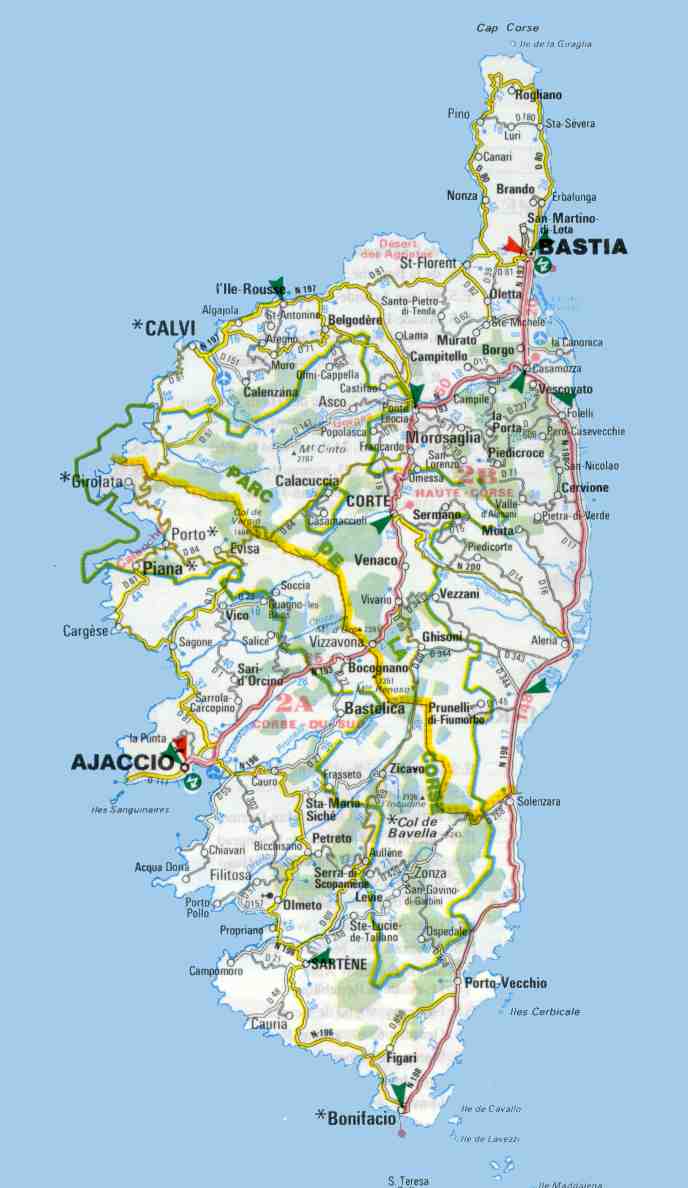 |
| Corsica |
 |
 |
| Click on the Flag to Learn More About Corsica |
| Its position has been considered significant as a platform for military operations, which were violent and ongoing between Italy and France for centuries. The possible unification with Sardinia has however always been seen as a dangerous eventuality, specially by England , because it would have granted to their ruler an overwhelming power over the Mediterranean Sea. At present, it is a region of France with 250.000 inhabitants. The regional capital is Ajaccio (Aiacciu). The region is divided in two departements. Main towns: Ajaccio (Aiacciu) (Bastia) (Corti) (Sart�) Other towns and villages: (San Fiorenzu) (Calvi) (Porti Vechju) (Bunifaziu |
| Corsica, Corsica in corsican and Corse in french, is an island in the Mediterranean Sea located roughly west of south of France and north of Sardinia (Italy |
| Corsica was the birthplace of Napoleon Bonaparte , whose parents were of the minor nobility. Corsica was under French control at the time, and Corsican nobles were offered the ability to gain French titles if they could prove their genealogy sufficiently. In the attempt to do that, his parents travelled to court in France, and like many other Corsican nobles, they sent young Napoleon to school there. |
| Napoleon Bonaparte (1769-1821) was emperor of France as Napoleon I from 1804-1814 and ruler over much of Europe . Napoleon was born on Corsica , which had only recently been occupied by the French. His family was a member of the minor Corsican nobility. His father arranged for Napoleon's education in France. Napoleon moved to France at the age of nine. He initially considered himself a foreigner and outsider; accusations of foreignness would dog him through his life. He had become an officer in the French army when the French revolution began in 1789. Napoleon returned to Corsica, where a nationalist struggle sought separation from France. Civil war broke out, and Napoleon's family had to flee to France. Napoleon supported the revolution and quickly rose through the ranks. In 1793, he freed Toulon from the royalists and the British troups supporting them. In 1795, when royalists marched against the National Convention in Paris, he had them shot. |
| An other important figure is [Pascal Paoli There is a movement on the island for Corsican independence. The French government is strongly opposed to the idea, fearing it would threaten the unity of France. Some supporters of Corsican independence have launched a campaign of bombings and assasinations to try to force the French government to grant it independence. In 2000, Prime Minister [Lionel Jospin <agreed to grant an increased degree of autonomy to Corsica, in exchange for a cessation of violence. This was opposed by the Gaullist opposition in the French National Assembly, on the grounds that it would lead to autonomy also for other regions (Brittany Provence Alsace etc.), and that would in turn lead eventually to the breakup of France. In any case, autonomy for Corsica has created a precedent for devolution to other French regions also. The proposed autonomy for Corsica would include greater protection for the Corsican language (corsu), the traditional language of the island. France traditionally has been discouraging of the use of regional or minority languages, viewing the supremacy of French as an assurance of the unity of the French state. Corsican (corsu) is a language and group of dialects spoken in the island of Corsica (France ), and as a variety in the Gallura region of Sardinia (Italy Divided into Northern Corsican, spoken in the Bastia (Bastia), Corte (Corti) area, and Southern Corsican (spoken in Sartene (Sart�), Porto-Vecchio (Porti-Vechju). The dialect of Ajaccio (Aiacciu) has been described as in transition. In the Sardinian region of Gallura (Gaddura), including the town of Tempio Pausania (Tempiu), and on the island of [La Maddalena (A Maddalena) the people speak "Gallurese ", a transitional dialect with many similarities with Southern Corsican. |
